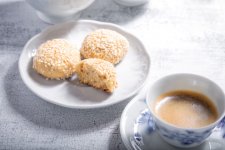d_kakavouli
Active member
I love sesame biscottis! This is what you'll need: 3/4 cup tahini, 3/4 cup sugar, 1 teaspoon cardamom or cinnamon, 1 teaspoon vanilla extract, 1/2 cup water, 1/2 cup orange juice, 3 cups all-purpose flour, 1 1/2 teaspoons baking soda, 1/4 teaspoon salt, and 1 teaspoon sesame seeds. Mix all of the dry ingredients then the wet ingredients separately. Then combine all of them together and bake at 375 until golden  I like to coat mine in plenty of sesame seeds but that's optional
I like to coat mine in plenty of sesame seeds but that's optional




